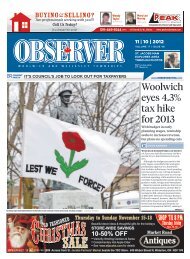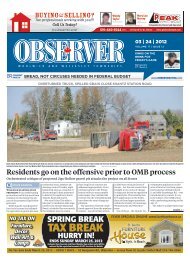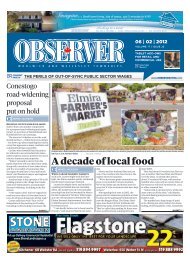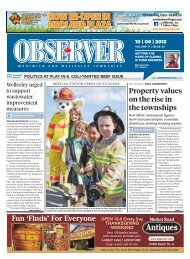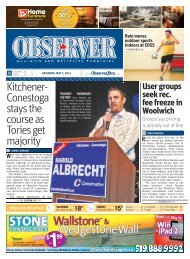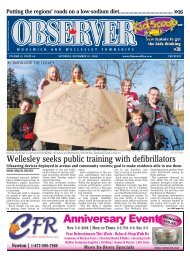cyclist dies after being hit by truck - ObserverXtra
cyclist dies after being hit by truck - ObserverXtra
cyclist dies after being hit by truck - ObserverXtra
Create successful ePaper yourself
Turn your PDF publications into a flip-book with our unique Google optimized e-Paper software.
4 | NEWS<br />
»FrOm THe eDiTOr | sTeVe KAnnOn<br />
THE OBSERVER | Saturday, December 06, 2008<br />
Municipal tax increases just compounding the problem<br />
The economic downturn<br />
is not to anyone’s<br />
liking, but<br />
something good<br />
might come of it if<br />
governments are<br />
forced to review<br />
their budgets on a<br />
line-<strong>by</strong>-line basis<br />
looking for savings.<br />
I’ve long argued that many, including<br />
local municipalities, simply use last<br />
year’s budget as the baseline for this<br />
year’s, adding on another inflationary<br />
increase (as a minimum), and ignoring<br />
the compounding impact that practice<br />
has on the taxes we pay.<br />
I’ve never bought into the “it’s only<br />
four or five per cent” argument or its<br />
corollary, the “it’s only X dollars more<br />
per year” claim. That’s a poor stance<br />
in any given year, but really falls apart<br />
when you take five plus four plus three<br />
plus four plus three plus …<br />
In that simplified five-year example, a<br />
person paying $3,000 a year in property<br />
taxes would pay $3,150 in the first year<br />
of increases, which, as politicians argue,<br />
isn’t the end of the world. But <strong>after</strong><br />
five years, that tax payout would be<br />
$3,684.71. Extend those increases year<br />
<strong>after</strong> year – tax jumps are the norm,<br />
<strong>after</strong> all – and the compounding does<br />
a real number on what the homeowner<br />
shells out, usually with nothing more<br />
to show for it.<br />
Each new bit of spending, and each<br />
year’s increase, always makes sense at<br />
the time, or at least finds enough people<br />
to say so. It’s only over time that<br />
we see the full impact – the death of a<br />
thousand cuts.<br />
The Record has run some telling stories<br />
about spending in the region and<br />
its cities, particularly when it comes to<br />
the growing size of government, and<br />
the resultant budget increases. Politicians<br />
and administrators defend their<br />
actions, but the numbers are damning.<br />
That’s not to say we have to aim for<br />
a tax freeze every year: costs rise, and<br />
councillors need to give heed to the longer<br />
term, investing in infrastructure<br />
and setting aside reserves for future<br />
projects. But approving increases <strong>by</strong><br />
default makes no sense either. That’s<br />
especially true in tougher economic<br />
times, when politicians of all levels<br />
must resist the urge to simply pass the<br />
expense along to the public in the form<br />
of higher taxes.<br />
It’s rare, however, to find politicians<br />
onside with that idea. Oh, some will<br />
agree to it – in theory. Few will act on<br />
it.<br />
In that vein, Kitchener councillor<br />
John Gazzola has been something of a<br />
voice in the wilderness.<br />
Although often finding himself in the<br />
minority – sometimes a minority of<br />
one – he’s usually the voice of public<br />
apprehension during debates sparked<br />
<strong>by</strong> the numerous big-ticket spending<br />
issues around the city’s council table.<br />
This, <strong>after</strong> all, is the city where council<br />
has bought up large stretches of the<br />
downtown with little redevelopment<br />
on the horizon, despite some off-thewall<br />
proposals over the years.<br />
The result has been a steady increase<br />
in the size of government and its bud-<br />
PHOTO | jOni milTenburg<br />
get and, therefore, taxes. That’s been<br />
especially true in this decade, when<br />
times have been good indeed.<br />
Now, with the economy sinking, you’d<br />
think council would be embracing the<br />
cuts necessary to cope with a new reality.<br />
Apparently not.<br />
“Times are tough, but is seems nobody’s<br />
told our council and staff that<br />
– it’s business as usual in Kitchener,”<br />
says Gazzola. “We don’t seem to be prepared<br />
to make some tough decisions.”<br />
In bad times, some short-term thinking<br />
is required in order to help residents<br />
weather the storm. Current budget<br />
numbers call for a five-per-cent tax<br />
increase, which just won’t do as people<br />
face losing their jobs and money is<br />
harder to come <strong>by</strong>, he argues.<br />
“I want to get us as close to a zero per<br />
cent tax increase as possible without<br />
cutting services.<br />
“We need to leave a few dollars in people’s<br />
pockets so they can spend a little<br />
in the economy to keep things going.”<br />
Now’s the time for municipalities to<br />
undo the tendency to look at last year’s<br />
budget as the base, and just add onto<br />
that without reviewing how they got to<br />
this stage, he adds.<br />
“Otherwise, it just keeps building and<br />
»AbOuT FACe<br />
JoHN ALbRECHT<br />
John’s Nursery<br />
How long have you been in business?<br />
We purchased the first acre of land in 1964. We<br />
started this from scratch, my wife and I. When<br />
we came, this was just cornfield.<br />
Where did you come from?<br />
We’re from Germany, from Bavaria. Lots of<br />
good beer there.<br />
What’s the busiest time for Christmas<br />
trees?<br />
building – but we can’t do that.”<br />
He also wonders why it is that lower<br />
costs for such things as energy, transportation<br />
and building materials<br />
aren’t reflected in municipal budgets.<br />
Those savings, along with increased<br />
funding from the federal and provincial<br />
governments, should be reflected<br />
in next year’s taxes, he says, though<br />
admittedly he’s not optimistic.<br />
“When we do have reduced costs, we<br />
tend to find other ways to blow it,” he<br />
said of the money.<br />
The problem, he argues, is that it’s<br />
too easy to come up with excuses to<br />
continue spending, because it’s easy to<br />
pass the costs along to the public.<br />
“It’s a one-way street. And it’s not<br />
sustainable.”<br />
Even on his own council, he’s not<br />
optimistic there will be any positive<br />
changes – “I have trouble getting people<br />
to agree with me,” Gazzola says of<br />
his council colleagues.<br />
And sounding more like a journalist<br />
than politician, he’s not holding<br />
out much hope politicians will move<br />
to hold the line on spending and taxes.<br />
“If this was an election year, it would<br />
be no problem: we would find a way.”<br />
From the 12th to the 19th . But people with balsam<br />
and Fraser firs, they can put them up early.<br />
When do you start cutting?<br />
We cut the first ones Nov. 21.<br />
What’s your favourite type of tree?<br />
My favorite is still the balsam fir, because it<br />
has that nice aroma, that smell to it.<br />
With the green movement, do more people<br />
want potted trees?<br />
When times are bad, there’s more demand<br />
for potted trees. When times are good, there’s<br />
more demand for cut. It’s a real trend.



